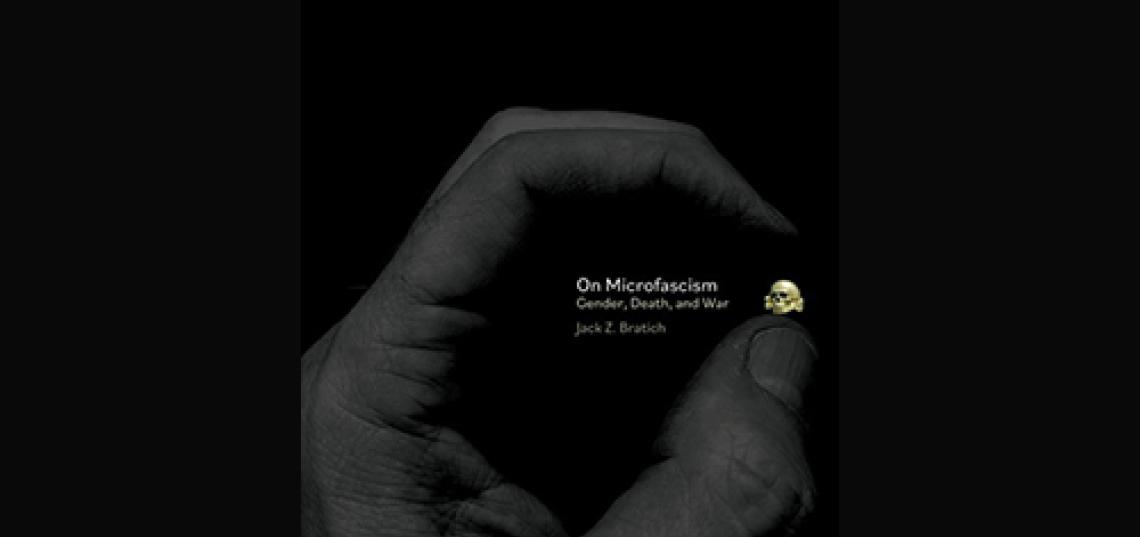
In his newly published book, “On Microfascism: Gender, War, and Death,” Professor of Journalism and Media Studies Jack Bratich explores the rise of fascism in modern America by examining the concept of “microfascism” with a particular focus on gender. Understanding fascism, Bratich said, is critical to addressing and dismantling it.
The book is a work of conceptual practice and theory, Bratich said, based on research he conducted on the recent rise of America’s “Far Right” political culture’s immersion in and use of digital media, and case studies he examined to develop the relatively underdeveloped concept of microfascism.
Microfascism, Bratich said, is the cultural way in which a fascist understanding of the world is generated from the hatreds that suffuse everyday life. It is the less visible, more emergent quality of fascism that is evident long before fascism becomes a fully-formed movement, party, or state administration that is instantly recognizable through uniforms, gestures, or slogans.
“Because fascism lurks in ordinary culture well before it gathers into a recognizable ‘movement’ or identifiable group, it becomes important to refine our perceptions and conceptions of fascism if we want to prevent its resurgence,” Bratich said. “Furthermore, I think it’s not only important to study familiar versions of fascist culture in the present, but also to detect ones that are continuing to percolate after more familiar phenomena (e.g. ‘alt-right’ and ‘Trumpism’) have receded from public scrutiny.”
Another core contribution the book makes, Bratich said, is his finding that gender and misogyny are at the core of the modern American brand of fascism.
“Much of the scholarship in the years since the Second World War has examined fascism through the lenses of race, ethnicity, colonialism, and antisemitism, which of course are crucial components to understanding fascism as a form of genocide,” Bratich said. “However, in this book, I try to expand on the understanding of modern fascist culture by foregrounding gender, which is often downplayed. The book revisits some marginalized and ignored thinkers along these lines (including Virginia Woolf), and it also brings into the conversation scholarship that rarely engages each other, for example contemporary studies of online misogyny with anthropological research on rites of passage with philosophical understandings of selfhood with studies of organized political violence.”
The book’s other significant findings, Bratich said, suggest “that antifascist work cannot be complacent just because a leader like Trump has receded to the shadows. It suggests that the work of fascism is embedded in everyday relationships and desires. It says that we need to look more closely at mass shooters for their beliefs about women. It suggests that we’re up against something that is both homicidal and suicidal, which makes analyzing and fighting it more challenging.”
While Bratich said he has studied social movements and media off and on for a decade, in the past he has always focused on progressive, leftist, or radical anti-authoritarian examples.
He said moving to this study of a very different political phenomenon to write this book was “fairly organic. I analyzed news reports as well as the statements and media products of the agents themselves. I also carefully read fascism’s most prominent cultural theorist, Julius Evola, to get a sense of where contemporary far-right actors were getting inspiration. The book gathers together a variety of approaches and analyses by other thinkers and researchers (contemporary and classic) to make sense of something that is both very new in its mediated cultural expression yet tied to older traditions.”
Ultimately, Bratich said, he hopes the book results in “a rethinking of what fascism is, how it’s embedded in culture, and where and when fascism takes root.”
Learn more about the Journalism and Media Studies Department on the Rutgers School of Communication and Information website.
Image: Courtesy of Jack Bratich
Discover more about “On Microfascism: Gender, War, and Death”:
In the Media
Podcast: Free City Radio Interview
Events
Book launch at Making Worlds, a bookstore in West Philadelphia, Pa.
Book Talk at Woodbine in Queens, NY.
“Patriarchy, War, and Microfascism: A Conversation with Jack Z. Bratich and Leopoldina Fortunati”
